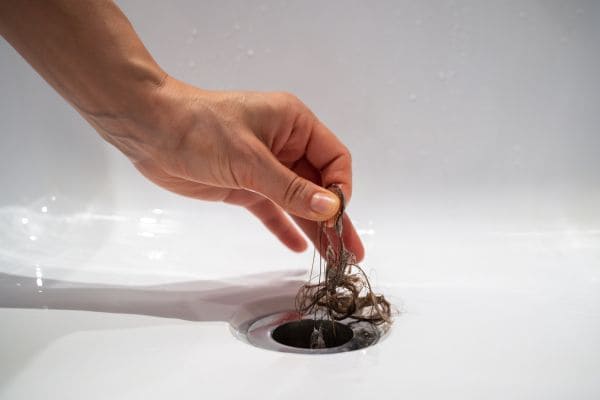Pipes are essential in our homes, facilitating everyday tasks and maintaining hygiene. However, clogs can become a major problem, affecting the normal flow of water and causing potential damage. In this guide, we offer you effective and easy-to-implement strategies to keep your pipes working properly and prevent clogs.
What causes clogged pipes?
Fats and oils
Fats, oils and grease are a silent enemy of kitchen plumbing. Although liquid when poured, they quickly solidify in the pipes, creating a sticky layer that traps other debris. This build-up can cause severe and persistent clogging. The best practice is to cool these substances and dispose of them in the rubbish or look for recycling alternatives, thus avoiding damage to your pipes.
Hair and soap residues
In the bathroom, the main causes of blockages are hair and soap residues. These elements accumulate in pipes, especially in showers and sinks, creating blockages that are difficult to remove. Using drain guards and regular cleaning helps to prevent these clogs. In addition, it is advisable to avoid products that leave heavy residues and opt for more pipe-friendly options.
Foreign objects
Small objects, hygiene products and other unsuitable items can cause serious blockages when accidentally dropped into the pipes. It is essential to educate everyone in the household about the importance of avoiding flushing these items down toilets and drains, as they can cause serious problems and costly repairs.
Tips to prevent blockages in the kitchen
Proper use of fats and oils
The correct management of fats, oils and grease is vital for the health of your pipes. Instead of pouring them down the sink, let them cool and solidify and then dispose of them in the trash. You can also consider recycling options for this waste. In addition, regular cleaning of drains with hot water and natural cleaning solutions such as baking soda and vinegar can prevent grease build-up.
Drainage filters and regular cleaning
Installing filters in drains is a simple but effective measure to capture food waste and prevent it from entering the pipes. Keep these filters clean and check them regularly to ensure optimum performance. Regular cleaning of drains, using methods such as hot water and natural cleaning mixtures, helps to keep pipes free of accumulated debris and grease.
Tips to prevent clogging in the bathroom
Use of drain guards
Drain guards in showers and sinks are essential to capture hair and prevent it from entering the pipes. These protectors must be cleaned frequently to ensure their effectiveness. In addition, it is important to pay attention to the cleaning and personal hygiene products used, choosing those that do not leave heavy residues that can accumulate in the pipes.
Careful with cleaning products
Select cleaning and personal care products that do not leave heavy residues in the pipes. This includes soaps, shampoos and other products that can contribute to clogging. Opting for more natural and biodegradable options can help keep your pipes clean and free of blockages.
Regular maintenance of pipelines
Professional inspections and cleaning
A crucial aspect of pipe maintenance is professional inspection and cleaning. These services, offered by experts such as Limpiezas Domingo e Hijos, not only help to identify potential problems before they become clogs, but also provide a deep clean that can be difficult to achieve with home methods. Regular inspections, especially those using cameras to examine pipes from the inside, are essential to maintain a sanitation system in optimal condition.
Education on the correct use of pipelines
Education is a powerful tool in congestion prevention. It is important to teach all members of the household about what should and should not be flushed down the drain. This includes avoiding discarding products such as wet wipes, even if they are labelled as ‘disposable’, and other items that are not designed to be processed by the sanitation system. Encouraging responsible plumbing habits is an essential step in keeping pipes free of blockages.
Regular inspections and repairs
In addition to cleaning and inspections, it is important to carry out regular checks and repairs. This may include replacing worn parts, repairing leaks and correcting structural problems that may contribute to clogging. Proactive maintenance can prevent major and costly problems in the future.
The role of soft water in clog prevention
Problems caused by hard water
Hard water, which contains high concentrations of minerals such as calcium and magnesium, can be a contributing factor in the formation of clogs. These minerals accumulate in the pipes, reducing the inside diameter and increasing the risk of blockages. In addition, hard water can react with soaps and detergents, forming a sticky residue that adheres to pipe walls and contributes to clogging.
Benefits of water softening
Investing in a water softening system can be an effective solution for dealing with hard water. Water softeners remove the minerals that cause hardness, reducing the build-up of mineral deposits in pipes and therefore significantly reducing the likelihood of clogging. In addition, soft water can improve the effectiveness of soaps and detergents, reducing the amount needed to clean, which also helps prevent the build-up of residues in pipes.
To complement the section on the role of soft water in clog prevention, you can refer to the study on the relationship between water softening and clog prevention. This study details how hard water can contribute to the build-up of mineral deposits in pipes, which in turn can cause clogs, and how water softening can help prevent these problems.
Detailed and relevant information on this topic can be found in the article “The Relationship Between Water Softening and Clog Prevention in Drains” available on the Energy5 website.


Recent Comments